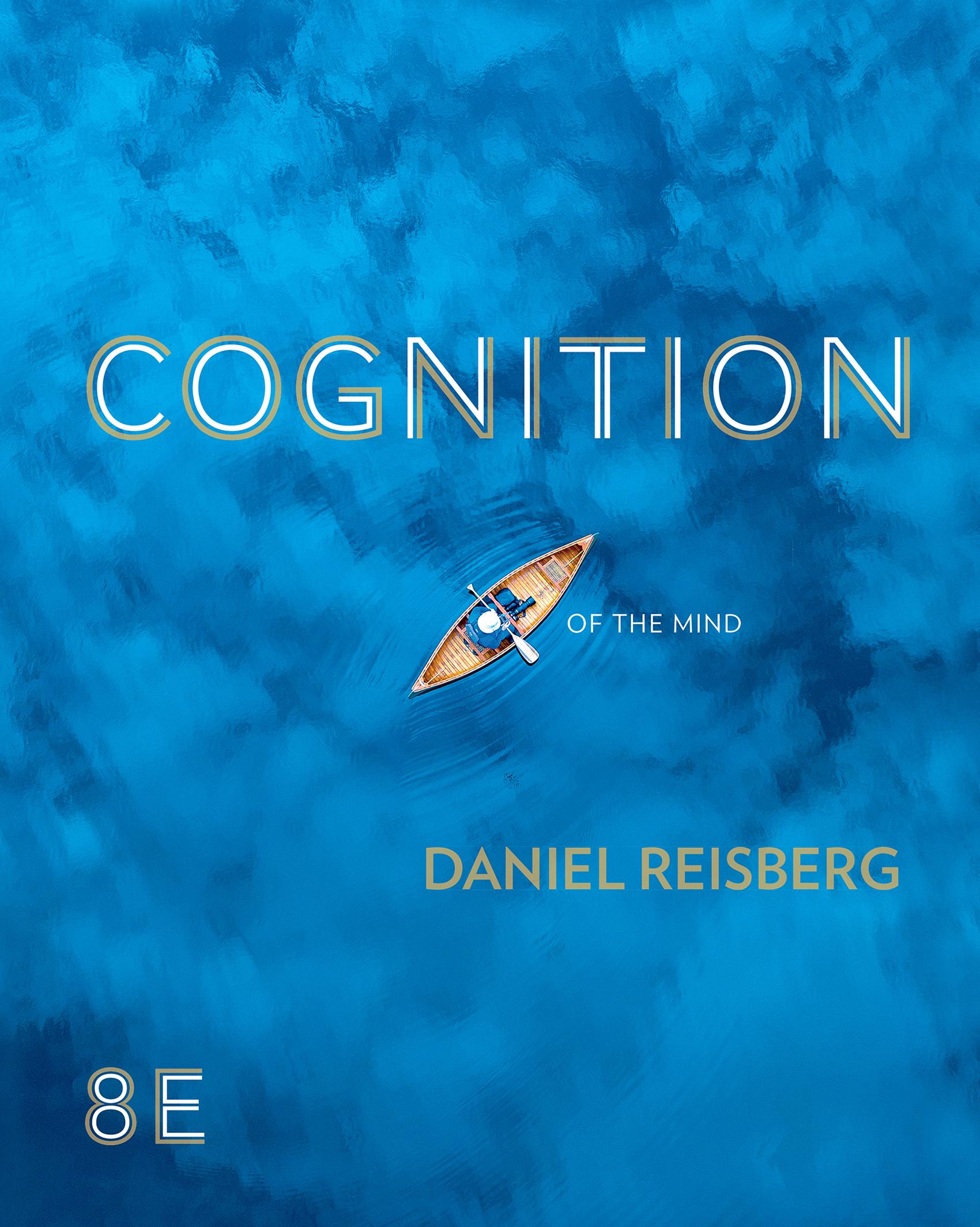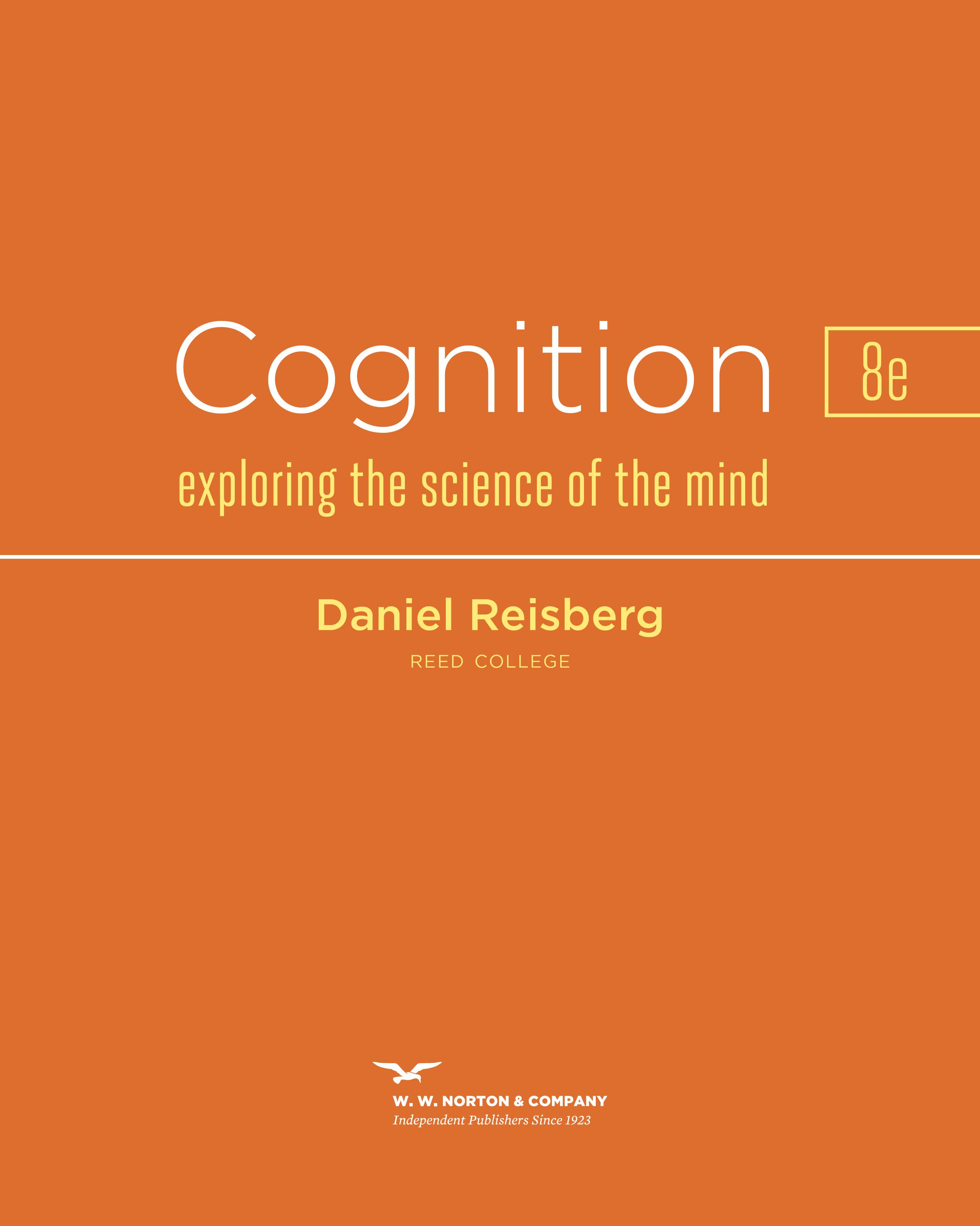
Cognition _ Exploring the Science of the Mind (9780393877403) - Reisberg, Daniel
Publisher’s Notice
Please note that this version of the ebook does not include access to any media or print supplements that are sold packaged with the printed book.

W. W. Norton & Company has been independent since its founding in 1923, when William Warder Norton and Mary D. Herter Norton first published lectures delivered at the People’s Institute, the adult education division of New York City’s Cooper Union. The firm soon expanded its program beyond the Institute, publishing books by celebrated academics from America and abroad. By midcentury, the two major pillars of Norton’s publishing program—trade books and college texts— were firmly established. In the 1950s, the Norton family transferred control of the company to its employees, and today—with a staff of five hundred and hundreds of trade, college, and professional titles published each year—W. W. Norton & Company stands as the largest and oldest publishing house owned wholly by its employees.
Copyright © 2022, 2019, 2016, 2013, 2010, 2006, 2001, 1997 by W. W. Norton & Company, Inc.
All rights reserved
Editor: Sheri L. Snavely
Senior Associate Editor: Gerra Goff
Project Editor: Taylere Peterson
Manuscript Editor: Alice Vigliani
Production Manager: Jane Searle
Managing Editor, College: Marian Johnson
Managing Editor, College Digital Media: Kim Yi
Media Editor: Kaitlin Coats
Associate Media Editor: Christina Fuery
Media Project Editors: Danielle Belfiore and Diane Cipollone
Media Editorial Assistant: Emilia Pesantes
Ebook Production Manager: Sophia Purut
Marketing Manager: Ken Barton
Design Director: Rubina Yeh
Art Director: Jillian Burr
Designer: Lisa Buckley
Photo Editor: Thomas Persano
Cognition _ Exploring the Science of the Mind (9780393877403) - Reisberg, Daniel
Permissions Associate: Patricia Wong
Permissions Manager: Megan Schindel
Composition/Illustrations: Graphic World, Inc.
Cover design: Demarinis Design LLC
Cover photograph: Canoe in Goshen, Vermont. Caleb Kenna Photography.
Permission to use copyrighted material is included in the credits section of this book, which begins on page C1.
Library of Congress Cataloging-in-Publication Data
Names: Reisberg, Daniel, author.
Title: Cognition : exploring the science of the mind / Daniel Reisberg.
Description: Eighth Edition. | New York, NY: W. W. Norton & Company, 2021. | Revised edition of the author’s Cognition, [2018] | Includes bibliographical references and index.
Identifiers: LCCN 2021022097 | ISBN 9780393877601 (paperback) | ISBN 9780393877403 (epub)
Subjects: LCSH: Cognitive psychology.
Classification: LCC BF201 .R45 2021 | DDC 153—dc23
LC record available at https://lccn.loc.gov/2021022097
ISBN: 978-0-393-87740-3 (ebook)
W. W. Norton & Company, Inc., 500 Fifth Avenue, New York, NY 10110 wwnorton.com
W. W. Norton & Company Ltd., 15 Carlisle Street, London W1D 3BS
Ebook version: 8.0-retailer
Cognition _ Exploring the Science of the Mind (9780393877403) - Reisberg, Daniel
With the hope of reminding people of the power and relevance of science.
PART 5 THINKING
Glossary G-1
References R-1
Credits C-1
Author Index I-1
Subject Index I-9
Form Perception 79
Constancy 86
The Perception of Depth 91
Cognitive Psychology and Technology: Virtual Reality 97
Chapter Review 99
4 Recognizing Objects 102
Recognition: Some Early Considerations 105
Word Recognition 107
Feature Nets and Word Recognition 112
Descendants of the Feature Net 121
Face Recognition 127
Top-Down Influences on Object Recognition 134
Cognitive Psychology and Education: Speed-Reading 137
Chapter Review 139
5 Paying Attention 142
Selective Attention 144
Selection via Priming 152
Divided Attention 170
Practice 176
Cognitive Psychology and Technology: “Virality” 180
Chapter Review 182 PART 3
185
6 The Acquisition of Memories and the Working-Memory System 186 Acquisition, Storage, and Retrieval 189
The Route into Memory 190
A Closer Look at Working Memory 196
Entering Long-Term Storage: The Need for Engagement 205
The Role of Meaning and Memory Connections 210
Organizing and Memorizing 213
The Study of Memory Acquisition 218
Cognitive Psychology and Education: How Should I Study? 220
Chapter Review 223
7 The Many Types of Memory 226
Learning as Preparation for Retrieval 229
The Memory Network 233
Different Forms of Memory Testing 238
Implicit Memory 241
Theoretical Treatments of Implicit Memory 246
Amnesia 253
Cognitive Psychology and Technology: “Truthiness” 259
Chapter Review 261
8 Remembering Complex Events 264
Memory Errors, Memory Gaps 266
Memory Errors: A Hypothesis 268
The Cost of Memory Errors 273
Avoiding Memory Errors 278
Forgetting 282
Autobiographical Memory 287
How General Are the Principles of Memory? 297
Cognitive Psychology and Health: Medical Histories 299
Chapter Review 302
PART 4 KNOWLEDGE 305
9 Concepts and Generic Knowledge 306
Understanding Concepts 308
Prototypes and Typicality Effects 311
Exemplars 315
The Difficulties with Categorizing via Resemblance 318
The Broader Role of Conceptual Knowledge 323
Cognition _ Exploring the Science of the Mind (9780393877403) - Reisberg, Daniel
The Diversity of Concepts 327
The Knowledge Network 330
Concepts: Putting the Pieces Together 336
Cognitive Psychology and the Law: Defining Legal Concepts 337
Chapter Review 339
10 Language 342
The Organization of Language 344
Phonology 346
Morphemes and Words 355
Syntax 356
Sentence Parsing 360
Prosody 364
Pragmatics 366
The Biological Roots of Language 368
Language and Thought 374
Cognitive Psychology and Technology: The “Vocabulary” of Texting? 379
Chapter Review 381
11 Visual Knowledge 384
Visual Imagery 386
Chronometric Studies of Imagery 389
Imagery and Perception 396
Visual Imagery and the Brain 397
Individual Differences in Imagery 401
Images Are Not Pictures 409
Long-Term Visual Memory 413
The Diversity of Knowledge 420
Cognitive Psychology and Health: Visualization and Pain Relief 421
Chapter Review 424
PART 5 THINKING 427
12 Judgment and Reasoning 428
Judgment 430
Detecting Covariation 437
Dual-Process Models 440
Triggers for Skilled Intuition 442
Confirmation and Disconfirmation 444
Logic 450
Decision Making 454
Cognitive Psychology and the Law: Pretrial Publicity 464
Chapter Review 468
13 Problem Solving and Creativity 472
General Problem-Solving Methods 474
Drawing on Experience 478
Defining the Problem 483
Creativity 489
Cognitive Psychology and Education: Brainstorming 498
Chapter Review 500
14 Intelligence 504
What Is Intelligence? 506
Intelligence beyond the IQ Test 515
The Roots of Intelligence 518
Cognitive Psychology and Health: IQ and Life Expectancy 527
Chapter Review 531
15 Conscious Thought, Unconscious Thought 534
The Study of Consciousness 536
The Cognitive Unconscious 537
Disruptions of Consciousness 544
Consciousness and Executive Control 547
The Cognitive Neuroscience of Consciousness 552
The Role of Phenomenal Experience 560
Consciousness: What Is Left Unsaid 565
Cognition _ Exploring the Science of the Mind (9780393877403) - Reisberg, Daniel
Cognitive Psychology and Health: “Vegetative States” 567
Chapter Review 570
Glossary G-1
References R-1
Credits C-1
Author Index I-1
Subject Index I-9
